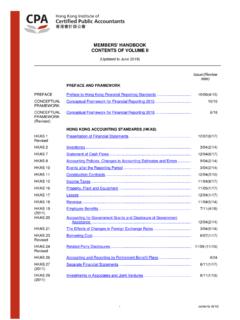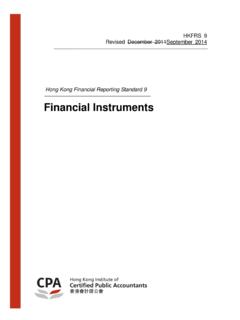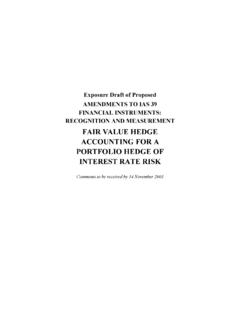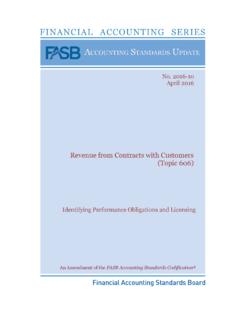Transcription of Accounting for transaction costs incurred in initial ...
1 Background and issueIn an initial public offering on the Hong Kong stock exchange, it is a common practice for a company to seek an exchange listing for all or part of its shares as well as offering to issue new shares at the IPO price. A multitude of different types of expenses are incurred during the IPO process the IPO costs and the question arises as to how these IPO costs should be accounted for: should they be deducted from equity or should they be expensed in profit or loss? The relevant guidance is found in HKAS and 38. 1 HKAS states: The transaction costs of an equity transaction are accounted for as a deduction from equity to the extent they are incremental costs directly attributable to the equity transaction that otherwise would have been avoided. HKAS states: transaction costs that relate jointly to more than one transaction (for example, costs of a concurrent offering of some shares and a stock exchange listing of other shares) are allocated to those transactions using a basis of allocation that is rational and consistent with similar transactions .
2 In applying the guidance found in HKAS and 38, it is clear that: Expenses that are directly attributable to the issue of new shares are accounted for as a deduction from An obvious example of such expenses is underwriting commission charged by underwriters for the new shares to be issued during the IPO. When shares are listed without any additional funding and issue of share capital (for example, in a listing by way of introduction whereby the company is seeking only to list its existing shares), the expenses incurred do not relate to the issue of equity instruments nor do they give rise to an asset. Therefore, such expenses are recognized in profit or loss as , in an IPO whereby a company is seeking an exchange listing for some or all of its shares as well as offering to issue new shares at the IPO price, careful professional judgment needs to be exercised regarding the application of HKAS and 38 to the IPO costs incurred , which may be rather substantial in amounts.
3 One key area requiring such exercise of professional judgment concerns the extent to which the IPO costs can be accounted for as a deduction from equity and centres on the following key questions: What is meant by an equity transaction ? Does it refer to the offer of new shares only, or does it also include the listing of existing shares in the context of the IPO as a whole? What do the terms incremental and directly attributable mean? How should the requirements of HKAS to allocate transaction costs that relate jointly to the listing of shares and the share offer be applied?Inappropriate application of judgment could result in a materially lower portion of the IPO costs being charged to profit or loss as listing expenses of existing shares, and a materially higher portion of the IPO costs being charged directly to equity than what it ought to be, or vice versa. These issues have been previously raised to the International Financial Reporting Interpretations Committee (now the IFRS Interpretations Committee), which issued an agenda decision in September 2008 on IAS 32 transaction costs to be Deducted from Equity, noting that: Only incremental costs directly attributable to issuing new equity instruments or acquiring previously outstanding equity instruments are considered to be related to an equity transaction under IAS 32; Judgment will be required to determine which costs are related solely to other activities undertaken at the same time as issuing equity, such as becoming a public entity or acquiring an exchange listing, and which costs are related jointly to both activities and, therefore, are required to be allocated in accordance with IAS ; Incremental costs are not limited to external costs .
4 However, on assessing how much of the internal costs under scrutiny is incremental, the company should identify the external cost that would have been incurred instead of the internal cost . Furthermore, the internal cost allocated to the equity transaction must be incurred in addition to on-going expenditures, in other words, it cannot simply be an allocation of, for example, payroll costs of permanent staff who would otherwise be employed on other projects; and Despite the fact that the terms incremental and directly attributable are not used with identical meanings throughout IFRSs, their notions are used in sufficiently similar ways throughout IFRSs which should allow constituents to apply them consistently. In view of existing guidance, the IFRIC declined to provide further clarification on the extent to which transactions costs should be accounted for as a deduction from equity and how to allocate costs that relate jointly to 46 June 2014 Technical updateAccounting for transaction costs incurred in initial public offerings A multitude of different types of expenses are incurred during the IPO process and the question arises as to how these IPO costs should be accounted for.
5 June 2014 47A PLUS more than one transaction . It is clear from the IFRIC agenda decision that the listing of shares and other related activities that do not involve the issue or acquisition of an entity's equity instruments are not equity transactions as contemplated in IAS , hence transaction costs relating to these activities should not be deducted from equity. The second and third questions above, however, remain basically unanswered and continue to be the subject of much professional debate, judgment and interpretation. The IFRIC has emphasized in its agenda decision that companies should first identify the costs that relate specifically to the issue of new shares and those that relate specifically to the listing of shares, which should be recognized in equity and profit or loss respectively; and then allocate the remaining IPO costs which relate jointly to the issue of new shares and the listing of existing shares on a rational and consistent basis in accordance with IAS , it would not be appropriate to treat all transaction costs of an IPO, excluding those that relate solely to the issue of new shares, as having been incurred jointly for the purpose of the issue of new shares and the listing of shares without further analysis.
6 With regard to incremental costs directly attributable to an equity transaction , the IFRIC agenda decision confirmed that such costs may include internal costs in addition to external costs . However, the allocation to equity should not include internal overhead costs merely because they can be directly allocated to the IPO transaction to be considered incremental it is necessary to demonstrate that these internal costs were incurred because of the IPO project and would not otherwise have been incurred . For example, payroll expenses for existing employees (even if working exclusively on the IPO project during certain lengthy periods of time), management time or administrative overheads would not normally be considered incremental costs . This is because these costs would have been incurred whether or not the IPO project had been the other hand, travelling costs and other expenses incurred by these personnel while working on the IPO project may be incremental costs that are directly attributable to the IPO project.
7 In practice, few internal costs will be regarded as incremental costs that are directly attributable to an equity transaction because the incremental part of the test will be difficult to examples of costs , which do not meet the incremental costs that are directly attributable requirement, are costs of researching different types of equity instruments to be issued during the IPO transaction , or of ascertaining the suitability or feasibility of particular equity instruments. These costs , even though they may be incremental costs , are not directly attributable to the share offer. Such costs are recognized in profit or loss even if they relate to the newly issued shares. Typical IPO costs and their Accounting treatmentThe following table provides examples of costs that are typically incurred in an IPO involving a concurrent listing of existing shares, and analyses whether the costs could 1 All references to HKFRS or HKAS apply equally to IFRS or For the purposes of this article new shares refers to those shares issued to raise new funds for the listing entity during the IPO.
8 This would not include, for example, shares issued as part of a group reorganization prior to or at the time of the IPO, which is accounted for using the merger Accounting method in accordance with Accounting Guideline 5 Merger Accounting for Common Control Combinations. According to paragraph 12 of AG5, expenditure relating to a common control combination is expensed as June 2014 Nature of costsEquity / expense / jointStamp duties, share registration costs , cost of handling share applications and other regulatory fees relating to the issuance of new shares during the IPOE quityCommissions paid to employees acting as selling agents that relate to the share issueEquity to the extent they are incrementalUnderwriting feesEquityListing feesExpense (normally not material)Tax and legal entity restructuring costs in anticipation of the IPOE xpense. Corporate restructurings are undertaken as a housekeeping matter to facilitate the listing process, and are not directly attributable to the issue of new to draft new articles of incorporation, audit com-mittee charter, by-laws and other agreementsExpense.
9 Such corporate governance activities are undertaken as a housekeeping matter to facilitate the listing process and/or future operations of the company, and are not directly attributable to the issue of new shares. Reporting Accountants' fees relating to prospectusJoint. A prospectus serves as both an offer document under the relevant Compa-nies Ordinance, as well as a listing document under the listing rules of the HKEx and the Securities and Futures (Stock Market Listing) Rules. However, in situations where additional fees and costs are incurred by the com-pany due to delays in and postponement of the IPO, the costs relating to the earlier attempt that can no longer be leveraged on should be expensed in profit or loss. Valuation fees in respect of valuation of sharesEquity to the extent they are incrementalValuation fees in respect of valuation of assets other than shares ( property) if the valuation is required to be disclosed in the prospectusJoint. A prospectus (or similar) may be required for an offer of shares without a list-ing and vice versa, but in practice IPO documents typically relate to both the share offer and the listing.
10 However, if the valuation is not required to be disclosed in the prospectus, such expense is not directly attributable to the IPO and should be and tax advice fees (other than those relating to restructuring in IPO above)Joint. Legal and tax advice is typically required for both the share offer and the listing to comply with the requirements established by the Securities and Futures Commission, the HKEx and other to the case for reporting accountants fees, in situations where addition-al fees and costs are incurred by the company due to delays in and postponement of the IPO, the additional fees and costs caused by the delays and postponement should be expensed in profit or updatebe regarded as: Incremental costs directly attributable to the issuance of new shares during the IPO and thus be deducted from equity in terms of HKAS (classified as Equity in the above table); Relating solely to listing or other activities undertaken at the same time as the share issue which should be expensed (classified as Expense in the above table).












